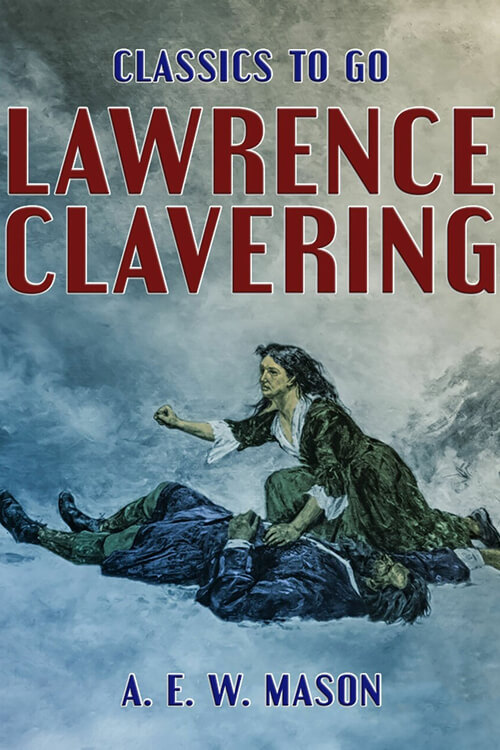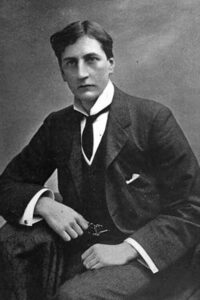
Lawrence Clavering
The picture hangs at my lodgings here at Avignon, a stone’s throw from the Porte de la Ligne, and within the shadow of Notre Dame des Doms, though its intended housing place was the great gallery of Blackladies. But it never did hang there, nor ever will; nor do I care that it should–no, not the scrape of a fiddle. I have heard men circumstanced like myself tell how, as they fell into years, more and more their thoughts flew homewards like so many carrier pigeons, each with its message of longing. But Blackladies, though it was the only home I ever knew in England, did not of right belong to me, and the period during which I was master there was so populous with troubles, so chequered with the impertinent follies of an inexperienced youth raised of a sudden above his station, that even now, after all these years, I look back on it with a burning shame. And if one day, perchance, as I walk in the alleys here beyond the city walls, the wind in the branches will whisper to me of the house and the brown hills about it–it is only because I was in England while I lived there. And if, again, as I happen to stand upon the banks of the Rhone, I see unexpectedly reflected in the broken mirror of its waters, the terraces, the gardens, the long row of windows, and am touched for the moment to a foolish melancholy by the native aspect of its gables–why, it is only because I look out here across a country of tourelles.
However, I come back to my lodging, and there is my picture on the wall–an accountant, as it were, ever casting up the good fortune and the mishaps of my life, and ever striking a sure balance in my favor.
I take the description of it from a letter which Mr. George Vertue wrote to a friend of mine in London, and that friend despatched to me. For, since the picture is a portrait of myself, it may be that an account of it from another’s hand will be more readily credited. Mr. Vertue saw it some years since at a dealer’s in Paris, whither, being at that time hard pressed for money, I had sent it but was lucky enough not to discover a purchaser.
“I have come across a very curious picture,” he wrote, “of which I would gladly know more, and I trust that you may help me to the knowledge. For more than once you have spoken to me of Mr. Lawrence Clavering, who fought for the Chevalier de St. George at Preston, and was out too in the Forty-five. The picture is the bust of a young gentleman painted by Anthony Herbert, and with all the laborious minuteness which was distinctive of his earlier methods. Indeed, in the delicacy with which the lace of the cravat is figured, the painter has, I think, exceeded himself, and even exceeded Vandermijn, whom at this period he seems to have taken for his model. The coat, too, which is of a rose-pink, is painted with the same elaboration, the very threads of the velvet being visible. The richness of the work gives a very artful effect when you come to look at the face, which chiefly provokes my curiosity. In color it is a dead white, except for the purple lips as though the blood stagnated there; the eyes are glassy and bright, with something of horror or fear staring out of them; the features knotted out of all comeliness; the mouth half opened and curled in the very sickness of pain; the whole expression, in a word, that of a man in the extremity of suffering–a soul’s torture superimposed upon an agony of the body; and all this painted with such circumstantial exactness as implies not merely great leisure in the artist, but also a singular pleasure and gusto in his subject….”
Read or download Book
A. E. W. Mason
Alfred Edward Woodley Mason (7 May 1865 – 22 November 1948) was an English author and Liberal Party Member of Parliament. He is best remembered for his 1902 novel of courage and cowardice in wartime, The Four Feathers, and is also known as the creator of Inspector Hanaud, a French detective who was an early template for Agatha Christie’s famous Hercule Poirot.
His prolific output in short stories and novels was frequently made and remade into films during his lifetime; though many of the silent versions have been lost or forgotten, the productions of Fire Over England (1937) and The Four Feathers (1939) remain enduring classics of British cinema.
Life
Mason was born in Camberwell. He studied at Dulwich College and graduated from Trinity College, Oxford, in 1888. He was a contemporary of fellow Liberal Anthony Hope, who went on to write the adventure novel The Prisoner of Zenda. He was an actor before he became a writer, and took the role of Major Plechanoff in the premiere of George Bernard Shaw’s Arms and the Man in 1894. He was also an avid cricket player.
Arthur Quiller-Couch and Oscar Wilde encouraged him to write, and his first novel, A Romance of Wastdale, was published in 1895. He was the author of more than 30 books, including At The Villa Rose (1910), a mystery novel in which he introduced his French detective, Inspector Hanaud; Hanaud’s career in six novels spanned from before World War I to after World War II.
His best-known book is The Four Feathers, which has been made into several films. Many consider it his masterpiece. Other books are The House of the Arrow (1924), No Other Tiger (1927), The Prisoner in the Opal (1929) and Fire Over England (1937). He contributed a short story, “The Conjurer”, to The Queen’s Book of the Red Cross.
Mason was elected as a Liberal Member of Parliament for Coventry in the 1906 general election. He served only a single term in Parliament, retiring at the next general election in January 1910.
His first play was the four-act comedy Marjory Strode. Mason wrote three plays that were produced and presented by Sir George Alexander in St James’s Theatre. He wrote, “I had three plays produced by George Alexander; one a failure, Colonel Smith, one which made a moderate profit, Open Windows, and one which was a considerable success, The Witness for the Defence. The light farce Colonel Smith opened on 23 April 1909. The Witness for the Defence opened on 1 February 1911, starring Sir George Alexander as Henry Thresk. In 1913 Mason’s problem play Open Windows opened on the evening of 11 March, starring Sydney Valentine as Phillip Hammond, Irene Vanbrugh as Cynthia Herrick, Sir George Alexander as John Herrick, with Rosalie Toller as Elsie Herrick.






